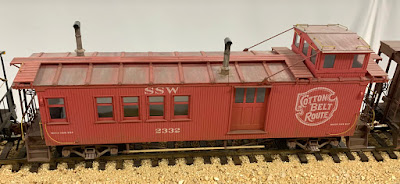This happens to have been the 20th anniversary of this excellent meeting, all 20 of which I have attended with pleasure. And that was why this year we even had a terrific cake (thanks to Carolyn Oliver and Ken Sanderson), complete with N-scale train, to commemorate the occasion. Great fun for all!
And thanks also to Marty Megregian, who managed to get this photo of the cake before it was cut, and the ravenous attendees began lining up for slices! A close-run thing.
As always, Mike Brock and his team, especially Jeff Aley and Marty, put on a well-organized and smooth-running meeting. And the hotel (naturally familiar with us all and with a well-run event that happens every year), did their usual good job on our behalf.
The ballroom, the site every year of both vendor tables and many model-display tables, was thronged with people whenever clinics were not in session. Below is just one snapshot of the crowd at one of these times. There are always interesting vendors and attractive products to look at, and of course superb models at the other end of the room.
Among the models I really liked this year was Jim Zwernemann’s Proto-48 caboose, entirely scratchbuilt from styrene, with brass handrails and smoke jacks. A pleasure to see this quality of modeling.
Another model I liked was another of Butch Eyler’s heavily weathered cars. Butch often brings along models with this quality of finishing, and here I especially liked the faded-out lettering and the heavy rusting of the roof. And it’s nice to tuck one but only one graffiti piece onto the car.
Lastly, I should mention the models that I chose to exhibit this year, drawn from some of my recent work on graffiti (see for example: https://modelingthesp.blogspot.com/2020/01/freight-car-graffiti-part-2.html ). I brought the car shown in the post just cited, and also a cement hopper, and showed them alongside some of my paper-overlay originals, ready to apply. (You may wish to click on the image to enlarge it and more easily read the text.)
I always enjoy the clinic program at this meeting (and this year presented two of them myself), but the most fun of any slide in any talk was Mont Switzer’s opening slide in his talk about Nickel Plate modeling. Those who have been to Cocoa Beach will recognize the familiar logo of the nearby Ron Jon surf shop, which Jeff Aley modified for the logo of this meeting (see it at: http://www.prototyperails.com/ ). That’s Mont at left, about to begin his talk. You can click to enlarge and see the billboard.
Lastly, a complete account of my experience at the meeting necessarily contains one more mention of the excellent Cuban restaurant near the hotel, at which I always have at least one meal and often more than one: Roberto’s. Having traveled in Cuba, I often remark to others that you will have to work hard to find food in today’s Cuba as good as what is served at Roberto’s.
Impressive that this was the 20th meeting. Having been to the lot of them, it makes me feel a little old to contemplate the fact that I wasn’t young when this series started . . . but time does march on. And every year a highlight is this meeting at Cocoa Beach.
Tony Thompson







I really like the photo of the Ron Jon Surf Shop billboard, because it brings back a few fond memories. I went to Florida Tech (in Melbourne) in the late 70's. At that time, the surf shop was located in a strip center at the end the 520 Causeway. Right next to the surf shop was a certain gentleman's club with a dubious name that my fraternity brothers & I used to visit on a regular basis. Long gone now.
ReplyDeleteThanks for presenting your two clinics. I really enjoyed your clinic on SP's Coast Line. I especially liked your description of how local and through freights operated. Although I'd seen it in photos many times, it never "clicked" that the F-units were used in A-B-A sets (on the Coast Division), and not A-B-B-A, until your presentation. SP bought in A-B-B-A sets, so I now wonder where the extra B-units were assigned.
ReplyDeleteIt also dawned on me that with the long layovers at division point, run through locomotives from adjacent divisions would be rare. So all those AC-4s and AC-5 "Flat Front" cab forwards that were assigned to the Western Division in 1953 would have no chance of showing up on Cuesta. Guess I'll have to reluctantly dispose of my AC-4s, or relegate them to shelf display).
Thanks, also, for taking time to answer a few of my questions. Hope to see you again next year!
Arved, don't be hasty with those AC-4s. I have photos of at least one at San Luis Obispo.
ReplyDeleteTony Thompson